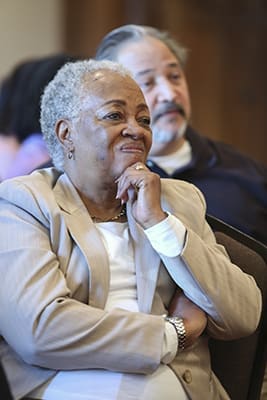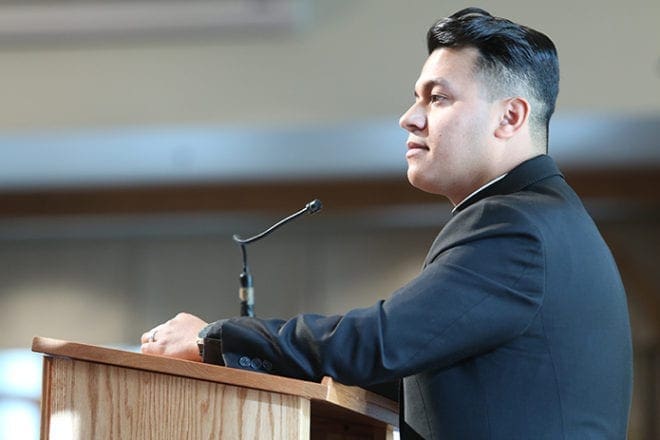Chris Stewart, a trial lawyer and partner at Atlanta law firm Stewart, Seay & Felton, spoke of the racial tension between police officers and the African-American community. Stewart is currently representing the family of the late Walter L. Scott, the South Carolina black man shot in the back five times by a white North Charleston police officer now on trial for murder. Photo By Michael Alexander
Atlanta
Local speakers try to bridge ‘wide valley’ separating races, cultures
By ANDREW NELSON, Staff Writer | Published November 17, 2016
ATLANTA—With history, theology, and life stories, Catholics and others concerned about race relations spent a day focused on the charged issue of race and how it shapes the lives of believers.
Blacks, whites and Latinos attended the conference, which was titled “An Honest Look at Racism” and drew from the Scripture verse in the first letter of St. John, “If we love one another, God dwells in us.”
More than 120 people gathered for the Saturday, Nov. 5, conference at Atlanta’s Christ the King Cathedral, where various speakers addressed the complexity of race from the history of Jesuit Georgetown University once owning slaves to current tension about law enforcement.
“Sometimes you can attend conferences, things are glossed over, generic. I thought perhaps this would be the same. But we really went there. The church is honest. The church is making an effort,” said Tony Parrish, who is black and worships at Our Lady of Lourdes Church, Atlanta.
Wrestling with the racial situations will require what’s been called a “culture of encounter,” learning from and listening to people who are different. But speakers said the opposite is taking place.
“We don’t seem to want to talk much. But how can we fall in love if we don’t talk?” asked Msgr. Dan Stack, whose Georgia ministry has included pastoring parishes with large Latino communities.
“We live apart most of the time,” said Michael Pasquier, a Louisiana State University historian of religion and the South.
Archdiocesan leaders organized the conference, a joint effort by the Office of Life, Dignity and Justice with the Intercultural and Ethnic Diversity Office.
Open discussion fosters hope
“We live in a city and state where the whole idea of civil rights was born and fought. The battle is still being fought,” said Kat Doyle, director of Justice and Peace Ministries, a panelist who shared resources for parishes and individuals to utilize.

Marian Willingham, foreground, of Sts. Peter and Paul Church, Decatur, and Donald Perez, background, of Transfiguration Church, Marietta, listen to one of the morning speakers during “An Honest Look at Racism” program at the Cathedral of Christ the King, Atlanta, Nov. 5. Photo By Michael Alexander
Archbishop Wilton D. Gregory has been leading an effort to make recommendations to U.S. bishops on responding to racial unrest triggered recently by deaths of African-American men by law enforcement.
The panelists included priests, lay people, attorneys, college professors and a member of the Atlanta Police Department.
“Racism is a mindset that flies in the face of sacred Scripture,” said theologian Diana Hayes, a retired Georgetown University professor. “Racism is a human institution, it is a social structure” continuing to burden black Americans, she said.
Addy Bauermeister, 30, attends Buckhead Church and works in software implementation. She attends the interracial discussion group ERACE that meets twice a month at Our Lady of Lourdes Church.
“It gives me hope that people are discussing institutional racism in the U.S. and the openness of the speakers to discuss racism as a sin. Every incidence of violence toward black men by police officers breaks my heart. It is important that white people are aware that this is happening, and will continue to happen, unless major changes are made to our criminal justice system,” said Bauermeister, who is white.
Jocelyn Johnson, a 27-year-old African-American graphic designer, said the recent violence has left her emotionally raw. It has taken a toll to witness what she believes is the public’s lack of interest in addressing the roots of violence.
“Racial tensions that have become more apparent in the past few years have prompted me to be the change I seek in this world. It’s undeniably taken its toll on me, but I do my best not to give up on humanity,” said Johnson, who also participates in ERACE.
Acting from perceptions
When a visiting priest was supportive of Black Lives Matter in a homily, pastor Father Vic Galier said he spent 30 minutes on the phone that week with an angry white person who left Mass before Communion. The visitor was upset at the support for the movement. However, Father Galier said, the black community is wounded and the activist organization voices that hurt.
“My parishioners want what’s right,” he said. “We listen, we pray, we act in the spirit of Jesus Christ who came to save us.”
Father Galier, who leads St. Anthony of Padua Church, Atlanta, said the gap between whites and blacks is stark on social media after spasms of violence.
“It’s clear there is a wide valley between us,” he said. “Both are living in their cultural expression but not looking at each other.”
Attorney Chris Stewart, a parishioner of St. Anthony, is increasingly taking on cases related to the police. He is a lawyer for the family of Walter Scott, the man fatally shot in North Charleston, South Carolina. The trial of the former police officer indicted for murder in Scott’s killing is underway.
His work is “not against police, but against police brutality. It’s a problem everyone needs to come to the table to fix,” he said. “The world is changing. It’s going to get complicated,” he said.

Father Rey Pineda, parochial vicar at the Cathedral of Christ the King, Atlanta, shares the personal story of his undocumented status and how he became eligible for the Deferred Action for Childhood Arrivals program prior to being ordained a priest in 2014. Photo By Michael Alexander
Father Desmond Drummer talked about the thicket of talking about race, and how it can take a surprising turn. After nine black women and men were gunned down during a Bible study in Mother Emanuel AME Church in Charleston, South Carolina, few people at his former parish said anything to him, said the priest, who is black.
“We dealt with it by not dealing with it,” he said about feeling isolated from the community.
A parishioner later gave him oil paintings depicting the historic church, he said.
“There is more going in in our hearts and minds than we reveal. I just believe folks didn’t know what to say,” Father Drummer said.
Too often people react from perceptions, he said. From his experience, he’s learned places of wealth can put on a better veneer to cover problems. There’s a cost that hiding the problems leaves people feeling isolated, he said, noting that the black community has a depth of spiritual songs of encouragement when times get tough often absent in white Christian communities. “I think these songs are encouraging and needed by everyone.”
Isolation is a feeling experienced by Father Rey Pineda as he grew up living in the U.S. without legal authorization. A 2011 protest rally was a turning point when he watched activists chant, “Undocumented! Unafraid!”
The protesters were young adults brought to the United States as children who had grown tired of the fear of deportation from the only country they knew, he said.
“I was moved to tears. I felt liberated. They were tears of joy, tears of hope. There was a constant fear which our lives revolved around,” he said.
Father Pineda was able to be ordained only after the Obama administration implemented the Deferred Action for Childhood Arrivals option for people like him.
“It feels like we belong in our home,” he said.
One of the final speakers was Archbishop Gregory, who reflected on watershed moments in the country’s history, like the election of the first African-American president and the passage of civil rights laws.
“We are talking about something that we thought we had addressed earlier,” he said. But racism similar to other sins is never gone, he said. “It’s part of our ongoing conversion. It’s a difficult struggle that goes on and on. But we can’t give up.”